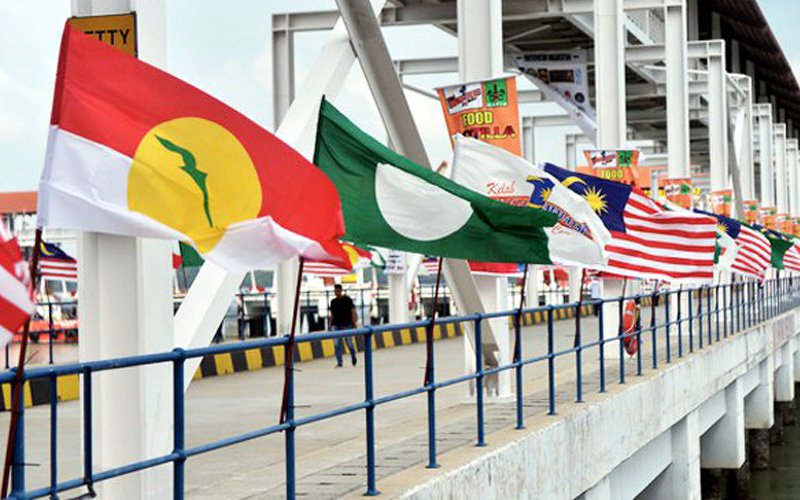Concern over Umno-PAS ties behind exit of Sabah leaders, say analysts

(FMT) – Two political analysts here have attributed last week’s exodus of Sabah Umno leaders to the party’s cooperation with Islamist party PAS.
Rahezzal Shah Abd Karim of UiTM Sabah said the state had always prided itself on being a tolerant and multiracial society. Because of this, he said, Sabah Umno was likely concerned when the party’s central leadership began to get “cosy” with PAS.

“There is a genuine concern among Sabah Umno members that Umno will be more conservative in terms of its approach.
“Being with PAS would certainly make it difficult for Sabah Umno to attract the majority of Sabahans, who have shown PAS that its brand of politics does not suit them,” he told FMT, citing the overwhelming rejection of PAS by Sabahans, including Muslim Bumiputeras.
Lee Kuok Tiung of Universiti Malaysia Sabah agreed, noting that Umno’s central body had been perceived as working more with the Islamist party in the peninsula than with long-time Barisan Nasional (BN) allies MCA and MIC.
He said Umno’s collaboration with PAS had raised concerns that Umno was no longer keeping to the party’s original struggle.
“Umno used to be seen as a moderate Malay party that worked together with all ethnic groups.
“But now, some see it as championing Malay and Muslim rights only. Umno appears to be spending more time with PAS than MCA and MIC.”
Lee said Umno had spoken of rejuvenation after the May 9 polls but none had been forthcoming. This caused members to become disillusioned, he added.
“Sabah Umno is a multiracial party. There are Kadazan Dusun Murut members and Christians, too.
“I think this is what put Sabah Umno in a dilemma, when suddenly you feel like you no longer share the same political ideology.”
He cited the opening statement by former Sabah Umno chief Hajiji Mohd Noor in announcing the group’s departure last week, saying Hajiji had made clear their concern for non-Muslim members of the state chapter.
Hajiji said the group’s decision to leave took into account the fact that Sabah Umno had over 100,000 non-Muslim members, and that any shift in the party’s political direction would jeopardise their support for Umno.
Last week’s exodus began with the departure of four MPs, nine assemblymen, two senators and dozens of division heads from Sabah.
This was followed by six other MPs in Peninsular Malaysia, reducing Umno’s parliamentary seats from 54 to 37.
Rahezzal and Lee warned in August, following developments in the peninsula, that it would be a big mistake if Sabah Umno partnered with PAS in the state for any upcoming election.
They said Sabahans would reject the politics of race and religion.

At the time, Lee suggested that the state chapter consider its position in Umno if its central leadership continued working with PAS.
Umno worked with PAS in a series of by-elections in the peninsula, striking an electoral understanding in order to avoid clashes.
PAS decided to give way to BN to allow its Umno candidate to contest the Sungai Kandis seat. However, Lokman Noor Adam was defeated by PKR’s Mohd Zawawi Abdul Mughni.
Umno deputy president Mohamad Hasan subsequently said BN would return the favour by sitting out the Seri Setia by-election to let PAS contest the state seat.
PAS also hinted that it might not contest the Balakong seat, which was eventually contested by MCA. Pakatan Harapan won all three by-elections.
Recently, Umno also rallied together with PAS against the International Convention on the Elimination of All Forms of Racial Discrimination in the nation’s capital.
Rahezzal told FMT the main reason for the exodus of Sabah Umno leaders was also survival.
“They knew that Sabah Umno is crumbling with the series of defections in Sabah, and they knew there was no guarantee that the numbers would stay.
“In order to stay relevant, they needed to decide whether to continue being with Umno or to pursue other platforms,” he said, adding that the lack of funds was another big factor but nothing unusual.
“We hear this all the time… switching sides so that they can serve their constituents because being with the government means they can have full access in terms of funding and assistance.
“But the flaw with this argument is that there wouldn’t be any opposition party left in the world if all of them thought along the same lines,” Rahezzal said.
Lee meanwhile predicted a major development in the Sabah political scene soon.
“After GE14, there have been lots of rumours that Umno might leave Sabah to give way to a Sabah-based local party. Well, this could be it.
“It’s easier for a small party or mosquito party to make decisions but not for the biggest party in Sabah.”

